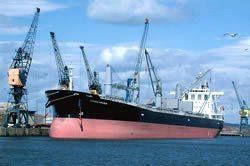
Two Moroccan stowaways have been found dead on a bulk fertiliser (phosphate) carrier Furness Karumba on its way from the Moroccan port of Laayoune to the port of Kwinana in Western Australia where it will arrive on November 14.
The town of Laayounne was founded in 1930 by the Spanish, but there were settlements in the area long time before that. A town grew up along the southern shores of the wadi (seasonal river) Seguiat al Hamra. Laayoune's importance came principally of being the administrative centre of the phosphate industry. In 1975 Morocco annexed Laayoune and a second town centre grew up on the hills over old Laayoune. The town has today more than 200,000 inhabitants (due to the undecided status of Western Sahara, population size is a political question), and is the town in Morocco that survives most on governmental subsidies.
It is understood four men had stowed away on the Panamanian registered ship before it left Morocco on Africa's north-west coast on October 7.
Police are unsure how two of the men died. According to one story I read the crew on the ship heard noises coming from a container and found only two of the men alive but in a very distressed state. According to some news stories the cargo hold was air-tight. It seems that the men stowed away thinking that the voyage would be a short one - certainly not as far away as Australia. The Australian immigration authorities, DIMIA, have been criticised around the world for their draconian approach to asylum seekers, but in the face of criticism from within Australia and other countries have softened their stance in the last few months.
Officers from the state and federal police will meet the ship when it docks at Kwinana on Monday night. DIMIA staff will also board the ship to place the survivors in detention. Some people have been in isolated detention centres in Australia for years before being granted visas..
Tags: Morocco, Fès, travel, Fez,

3 comments:
I had never even been camping before this weekend and have still never ridden a horse, but I survived in my sandy tent and even climbed on the hump of a camel and rode across the dunes.
I followed the link to the article you quote. For me, this quote says a lot about her perspective. I see the traveler is from Arkansas. And, though I wanted a little better picture to make the call, it looks like they haven't quite bred all the 'sister' out of that writer.
In my experience, black folks (and especially southern black folks) don't typically name their little girls Yvette to send them halfway around the world to hang out in third world cities where donkeys, mules and camels are common modes of transportation.
Very true Buddha! Nice to see you here.
Based about solely on my limited experience and observation, I wonder if it is a kind of shared cultural sense of deprivation with its roots in the slave experience.
That is, it appears to me that we, as a group, simply don't see good reason to give up our warm beds, our familiar toilets, our autos and other assorted creature comforts.
And, thx for the bread crumbs to follow.
Post a Comment